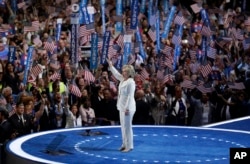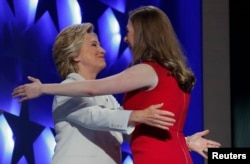She has made history. She has the domestic and foreign experience. And she has the endorsement of her primary opponent.
Now, can Hillary Clinton overcome her historically high negative ratings for a Democratic presidential candidate?
Just 38 percent of Americans view Clinton favorably—the lowest point in her 24-year national career—according to a Gallup poll conducted the week before the convention.
And in a recent Washington Post-ABC News poll, 54 percent of those surveyed said they had an unfavorable impression of Clinton, with only 39 percent saying she is honest and trustworthy.
Part of this impression can be attributed to the controversy surrounding her use of a private email server during her tenure as secretary of state from 2009 to 2013.
“The major problem for Clinton is to overcome the credibility gap,” said American University historian Allan Lichtman. He cited another Washington Post-ABC poll that found "56 percent of Americans thought she ought to have been indicted for her problems with her personal email server. That is quite extraordinary.”
Trust is an issue for the standard bearers of both major parties.
A New York Times/CBS News poll in May found that almost two-thirds of registered U.S. voters view both Trump and Clinton skeptically on that front. Asked whether the candidate is “honest and trustworthy,” 64 percent of respondents answered “no” in assessing each one.
The Washington Post’s Wonkblog wrote this week that Clinton’s exaggerations and omissions “tend to be defensive” in response to scandals and allegations, it said. Trump’s “are more on the offensive, more self-promotional,” such as inflating business successes or raising “allegations against his political opponents and minority groups.”
The fact-checking service PolitiFact, in evaluating 203 of Trump's statements and 226 of Clinton's, “found fewer than a third of Clinton's were ‘mostly false’ or worse,” according to Wonkblog. “It rated 71 percent of Trump's the same way.”
Projecting warmth
With Clinton, it’s not just the email controversy. Analysts say she has to counter the impression she is unfeeling or unable to relate to issues affecting the average American.
“Hillary is seen as a cold fish who is calculating and not of the highest integrity,” said political consultant Gary Nordlinger. “She has to show she is warm, compassionate and trustworthy.”
Speakers at this week’s Democratic National Convention, including her husband, former President Bill Clinton, have aimed to highlight a more personal side of Clinton, recounting her days registering Mexican-American voters, advocating for early childhood education, and being a mother to daughter Chelsea.
Democratic strategist Robert Weiner said Clinton must show more of that side to voters while on the campaign trail leading up to November 8.
“She has got to be personal, she has got to be real,” Weiner said. “She has got to say, with emotion, how these issues impact her and how she knows the families that are impacted by them.”
Weiner, a former White House spokesman for Bill Clinton, says while the former first lady, U.S. senator and secretary of state may lack the charisma of some past candidates, she makes up for this shortcoming with her problem-solving ability.
“She is incredibly smart," noted Weiner. "She assesses with detail all the policy implications and gets to the root cause of a problem and the guts of the solution better than anyone I have seen, and that includes Obama and Bill Clinton."
Georgetown University professor Stephen Wayne said in the tumultuous fight against Republican nominee Donald Trump, being the even-keeled, an experienced candidate may not be such a negative as the race closes in on the election.
“She has to act as the mature, experienced, knowledgeable candidate, and she is going to be very unexciting and uninspiring,” Wayne said. “You sort of can’t do both at the same time.”
Attacks via messaging
Still, in a presidential contest that has seen businessman Donald Trump defeat 16 other fellow Republicans to win the nomination, Clinton also cannot afford to play it safe if she wants to win votes, said Nordlinger.
“In an outsider year, you have the absolute queen of the political establishment running against the absolute king of the anti-establishment, so that dynamic favors Trump,” the George Washington University professor said.
And the Republican nominee is certain to continue his sharp attacks on Clinton—whether calling her crooked or corrupt.
Clinton, too, should be sharp in her counterattacks, said Wayne, author of The Road to the White House: The Politics of Presidential Elections.
“She has got to get under Trump’s skin, because when you get under his skin, he explodes," Wayne said. “And when he explodes, he shows an emotion that most people don’t associate with what we want in a president.”
Clinton must also focus her messaging, analysts say. “She seems a bit distant, disconnected. She needs to figure out a better way to connect with voters and develop a clear message,” said American University historian Lichtman.
Michael Kazin, author of American Dreamers: How the Left Changed a Nation, said “stronger together” is not one of them.
“Who is stronger together?" he asked. 'She has to identify two or three issues she really cares about and run on those, mention them again and again, and those issues have to have a clear contrast from Donald Trump."
Getting voters to the polls
More than anything, analysts say Clinton and her campaign must get out the vote in order to win the presidency for Democrats.
“So many of the people who should be their core constituencies—young people, African-Americans, Latinos—don’t vote in as large number as Republicans,” Kazin noted. “So if [Democrats] lose, it will be because their people did not come out and vote, not because a majority of Americans who are eligible to vote want to vote for Donald Trump.”







